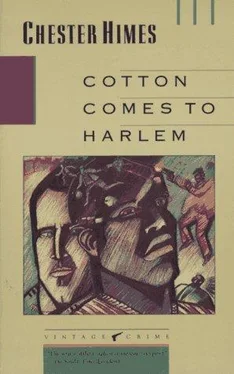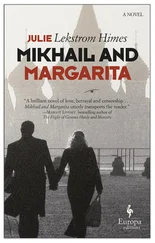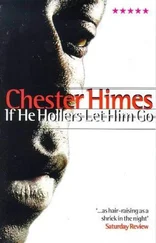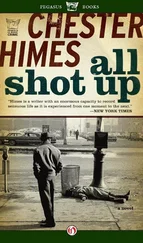Chester Himes - Cotton comes to Harlem
Здесь есть возможность читать онлайн «Chester Himes - Cotton comes to Harlem» весь текст электронной книги совершенно бесплатно (целиком полную версию без сокращений). В некоторых случаях можно слушать аудио, скачать через торрент в формате fb2 и присутствует краткое содержание. Жанр: Полицейский детектив, на английском языке. Описание произведения, (предисловие) а так же отзывы посетителей доступны на портале библиотеки ЛибКат.
- Название:Cotton comes to Harlem
- Автор:
- Жанр:
- Год:неизвестен
- ISBN:нет данных
- Рейтинг книги:4 / 5. Голосов: 1
-
Избранное:Добавить в избранное
- Отзывы:
-
Ваша оценка:
- 80
- 1
- 2
- 3
- 4
- 5
Cotton comes to Harlem: краткое содержание, описание и аннотация
Предлагаем к чтению аннотацию, описание, краткое содержание или предисловие (зависит от того, что написал сам автор книги «Cotton comes to Harlem»). Если вы не нашли необходимую информацию о книге — напишите в комментариях, мы постараемся отыскать её.
Cotton comes to Harlem — читать онлайн бесплатно полную книгу (весь текст) целиком
Ниже представлен текст книги, разбитый по страницам. Система сохранения места последней прочитанной страницы, позволяет с удобством читать онлайн бесплатно книгу «Cotton comes to Harlem», без необходимости каждый раз заново искать на чём Вы остановились. Поставьте закладку, и сможете в любой момент перейти на страницу, на которой закончили чтение.
Интервал:
Закладка:
Chester Himes
Cotton comes to Harlem
1
The voice from the sound truck said:
"Each family, no matter how big it is, will be asked to put up one thousand dollars. You will get your transportation free, five acres of fertile land in Africa, a mule and a plow and all the seed you need, free. Cows, pigs and chickens cost extra, but at the minimum. No profit on this deal."
A sea of dark faces wavered before the speaker's long table, rapturous and intent.
"Ain't it wonderful, honey?" said a big black woman with eyes like stars. "We're going back to Africa."
Her tall lean husband shook his head in awe. "After all these four hundred years."
"Here I is been cooking in white folk's kitchens for more than thirty years. Lord, can it be true?" A stooped old woman voiced a lingering doubt.
The smooth brown speaker with the honest eyes and earnest face heard her. "It's true all right," he said. "Just step right up and give us the particulars and deposit your thousand dollars and you'll have a place on the first boat going over."
A grumpy old man with a head of white hair shuffled forward to fill out a form and deposit his thousand dollars, muttering to himself, "It sure took long enough."
The two pretty black girls taking applications looked up with dazzling smiles.
"Look how long it took the Jews to get out of Egypt," one said.
"The hand of God is slow but sure," said the other.
It was a big night in the lives of all these assembled colored people. Now at last, after months of flaming denouncements of the injustice and hypocrisy of white people, hurled from the pulpit of his church; after months of eulogy heaped upon the holy land of Africa, young Reverend Deke O'Malley was at last putting words into action. Tonight he was signing up the people to go on his three ships back to Africa. Huge hand-drawings of the ships stood in prominent view behind the speaker's table, appearing to have the size and design of the SS Queen Elizabeth. Before them stood Reverend O'Malley, his tall lithe body clad in dark summer worsted, his fresh handsome face exuding benign authority and inspiring total confidence, flanked by his secretaries and the two young men most active in recruiting applicants.
A vacant lot in the "Valley" of Harlem near the railroad tracks, where slum tenements had been razed for a new housing development, had been taken over for the occasion. More than a thousand people milled about the patches of old, uneven concrete amid the baked, cindery earth littered with stones, piles of rubbish, dog droppings, broken glass, scattered rags and clusters of stinkweed.
The hot summer night was lit by flashes of sheet lighming, threatening rain, and the air was oppressive with dust, density and motor fumes. Stink drifted from the surrounding slums, now more overcrowded than ever due to the relocation of families from the site of the new buildings to be erected to relieve the overcrowding. But nothing troubled the jubilance of these dark people filled with faith and hope.
The meeting was well organized. The speaker's table stood at one end, draped with a banner reading: BACK TO AFRICA — LAST CHANCE!!! Behind it, beside the drawings of the ships, stood an armored truck, its back doors open, flanked by two black guards wearing khaki uniforms and side arms. To the other side stood the sound truck with amplifiers atop. Tee-shirted young men in tightfitting jeans roamed about with solemn, unsmiling expressions, swelled with a sense of importance ready to eject any doubters.
But for many of these true-believers it was also a picnic. Bottles of wine, beer and whisky were passed about. Here and there a soul-brother cut a dance step. White teeth flashed in black, laughing faces. Eyes spoke. Bodies promised. They were all charged with anticipation.
A pit had been dug in the center of the lot, housing a charcoal fire covered with an iron grill. Rows of pork ribs were slowly cooking on the grill, dripping fat into the hot coals with a sizzling of pungent smoke, turned from time to time by four "hook-men" with long iron hooks. A white-uniformed chef with a longhandled ladle basted the ribs with hot sauce as they cooked, supervising the turning, his tall white chef's cap bobbing over his sweating black face. Two matronly women clad in white nurses' uniforms sat at a kitchen table, placing the cooked ribs into paper plates, adding bread and potato salad, and selling them for one dollar a serving.
The tempting, tantalizing smell of barbecued ribs rose in the air above the stink. Shirt-sleeved men, thinly clad women and halfnaked children jostled each other good-naturedly, eating the spicy meat and dropping the bones underfoot.
Above the din of transistor radios broadcasting the night's baseball games, and the bursts of laughter, the sudden shrieks, the other loud voices, came the blaring voice of Reverend Deke O'Malley from the sound truck: "Africa is our native land and we are going back. No more picking cotton for the white folks and living on fatback and corn pone…"
"Yea, baby, yea."
"See that sign," Reverend O'Malley shouted, pointing to a large wooden sign against the wire fence which proclaimed that the low-rent housing development to be erected on that site would be completed within two and one half years, and listed the prices of the apartments, which no family among those assembled there could afford to pay. "Two years you have to wait to move into some boxes — if you can get in, and if you can pay the high rent after you get in. By that time you will be harvesting your second crop in Africa, living in warm sunny houses where the only fire you'll ever need will be for cooking, where we'll have our own governments and our own rulers — black, like us — "
"I hear you, baby, I hear you."
The thousand-dollar subscriptions poured in. The starry-eyed black people were putting their chips on hope. One after another they went forward solemnly and put down their thousand dollars and signed on the dotted line. The armed guards took the money and stacked it carefully into an open safe in the armored truck.
"How many?" Reverend O'Malley asked one of his secretaries in a whisper.
"Eighty-seven," she whispered in reply.
"Tonight might be your last chance," Reverend O'Malley said over the amplifiers. "Next week I must go elsewhere and give all of our brothers a chance to return to our native land. God said the meek shall inherit the earth; we have been meek long enough; now we shall come into our inheritance."
"Amen, Reverend! Amen!"
Sad-eyed Puerto Ricans from nearby Spanish Harlem and the lost and hungry black people from black Harlem who didn't have the thousand dollars to return to their native land congregated outside the high wire fence, smelling the tantalizing barbecue, dreaming of the day when they could also go back home in triumph and contentment.
"Who's that man?" one of them asked.
"Child, he's the young Communist Christian preacher who's going to take our folks back to Africa."
A police cruiser was parked at the curb. Two white cops in the front seat cast sour looks over the assemblage.
"Where you think they got a permit for this meeting?"
"Search me. Lieutenant Anderson said leave them alone."
"This country is being run by niggers."
They lit cigarettes and smoked in sullen silence.
Inside the fence, three colored cops patrolled the assemblage, swapping jokes with their soul-brothers, exchanging grins, relaxed and friendly.
During a lull in the speaker's voice, two big colored men in dark rumpled suits approached the speaker's table. Bulges from pistols in shoulder slings showed beneath their coats. The guards of the armored truck became alert. The two young recruiting agents, flanking the table, pushed back their chairs.
Читать дальшеИнтервал:
Закладка:
Похожие книги на «Cotton comes to Harlem»
Представляем Вашему вниманию похожие книги на «Cotton comes to Harlem» списком для выбора. Мы отобрали схожую по названию и смыслу литературу в надежде предоставить читателям больше вариантов отыскать новые, интересные, ещё непрочитанные произведения.
Обсуждение, отзывы о книге «Cotton comes to Harlem» и просто собственные мнения читателей. Оставьте ваши комментарии, напишите, что Вы думаете о произведении, его смысле или главных героях. Укажите что конкретно понравилось, а что нет, и почему Вы так считаете.












